What If He Dies?: From Caesar to Augustus
What happens when a personalist dictatorship like the Trump regime suddenly loses its central figure of truth and authority
Introduction
The Trump regime is held together by a personality cult—not just Trump’s followers, but the entire senior leadership of the government. People are bound to him through a psychological system of control which I have described in detail.
But what if Donald Trump dies? Or becomes completely incapacitated?
This is an important question because Trump’s health seems to be in apparent decline. The last time Trump was seen in public was the Cabinet meeting on Tuesday where he spent the entire three hours trying to conceal persistent bruising on his right hand. At every recent appearance, he has seemed obsessed with covering it up. He’s also had notable swelling of his ankles which the White House has waved off as no problem.
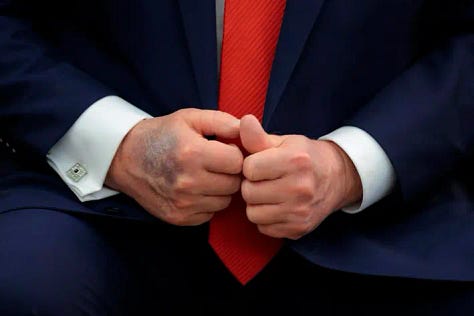
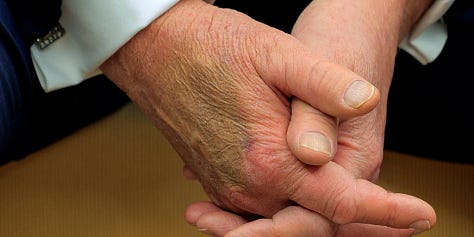
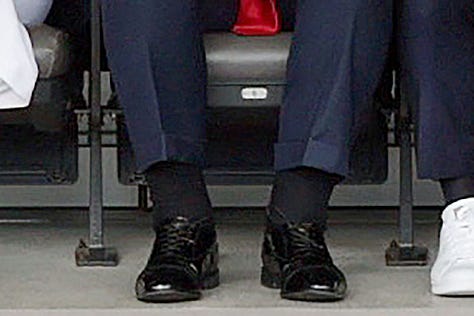
Regardless of the accuracy of speculation about Trump’s health, his mortality is very real, and his disappearance would rupture the regime’s psychology. Specifically:
JD Vance has no personality cult—because he has no personality.
What happens when a personalist dictatorship like the Trump regime suddenly loses its central figure of truth and authority—and there is no one with the charisma to replace him? Here are three historical examples that may shed some light on the potential outcomes.
Endurance: Caesar → Augustus
A personalist dictator breaks a centuries-long republic and transforms it into an empire of autocracy.
The Roman Republic lasted for nearly five centuries (509 BC-27 BC), but increasing internal strife, including a cycle of civil wars, left it weak and hollowed out. Charismatic Roman general Julius Caesar, who had led the Roman Armies in the Gallic Wars, clashed with Pompey and the Senate. He famously crossed the Rubicon in 49 BC, won the civil war, and in February 44 BC declared himself dictator. But on the Ides of March that year, he was famously assassinated.
Caesar’s adopted heir Octavian (later Augustus) and Mark Antony, defeated the assassins, but split apart in a power struggle. After Augustus won the Battle of Actium in 30 BC, Marc Antony and his wife Egyptian queen Cleopatra committed suicide, leaving Augustus as the sole survivor. In 27 BC, Augustus was declared the first Emperor of the Roman Empire, effectively transforming the republic into a monarchy.
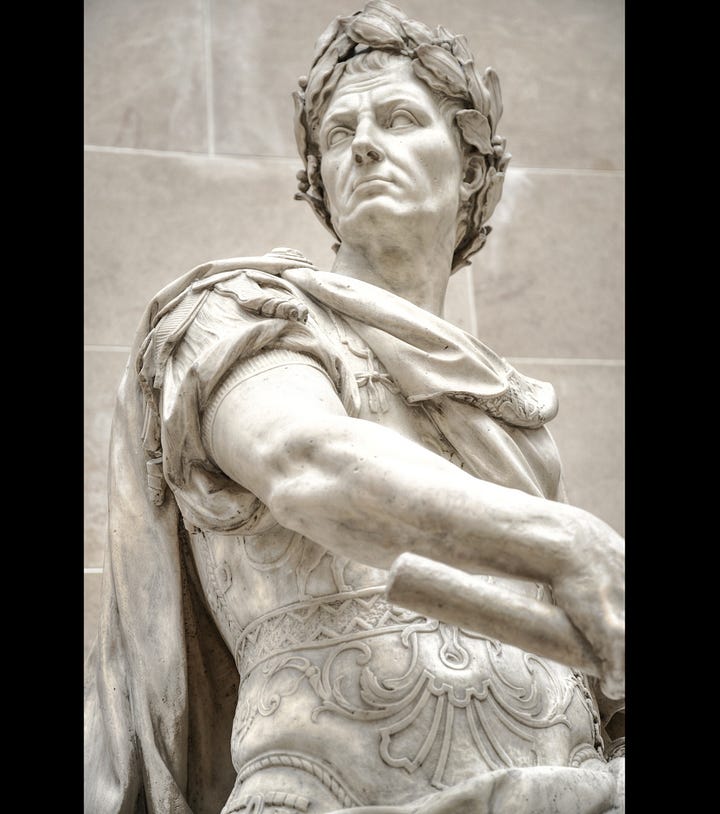
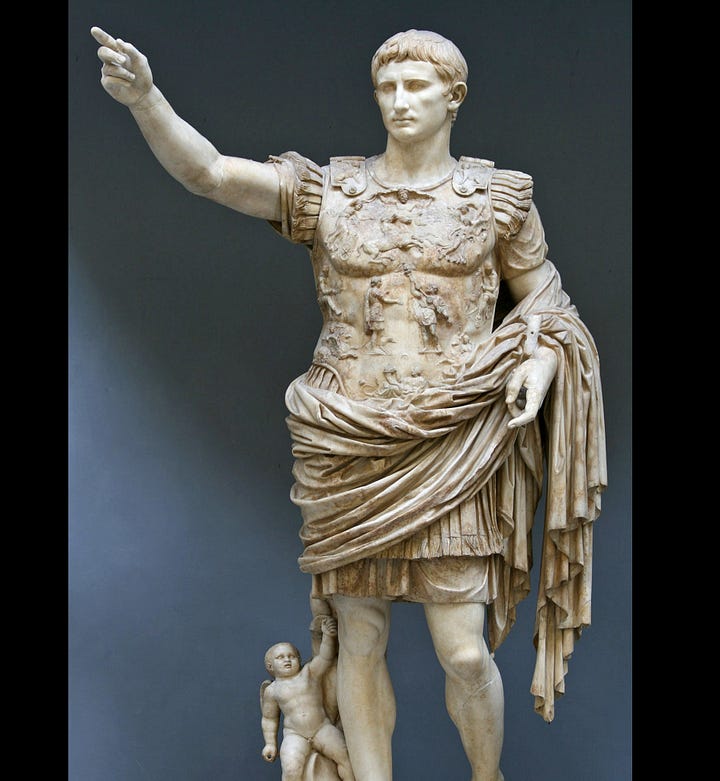
Augustus did not have the populist attraction of Caesar, nor the charisma. But Augustus was calculated and shrewd. He knew Caesar’s mistake was appearing too openly as a dictator. Instead of flaunting personalist power, he carefully cloaked it in institutions:
He kept republican forms (the Senate, consuls, assemblies) but drained them of autonomy.
He created the Praetorian Guard as a permanent military force loyal to him personally.
He restructured provincial governance, taxation, and the military so they answered to him.
This system—the Principate—lasted for centuries. The charisma of Caesar was translated by Augustus into the permanence of empire. However, throughout the history of the Roman Empire, emperors swung from personalist and charismatic like Caligula and Nero—whose reigns uniformly ended in chaos and collapse—and more bureaucratic/institutional emperors like Claudius and Marcus Aurelius.
If Peter Thiel and JD Vance succeed in leveraging Trump’s chaotic personalist dictatorship into an institutionalized autocracy, America could be facing another Roman Empire—a colder, more technocratic dictatorship that endures for longer than we want to imagine.
Survival: Stalin → Khrushchev
The personalist, totalitarian leader of a global superpower enabled by a system of psychological control suddenly dies. While the ensuing regime attempts to distance itself from the crimes of its leader, it never fully recovers and ultimately fails.
After Lenin’s death in 1924, General Secretary of the Communist Party Joseph Stalin won a power struggle with Leon Trotsky to become the leader of the Soviet Union. By the 1930s, he had consolidated his power into a totalitarian dictatorship fueled by a deliberately engineered personality cult. His ideological rigidity led to errors like Lysenkoism, a pseudo-science that replaced genetics and led to millions of deaths from famine.
However, his defeat of the Nazi invasion in WWII and the subsequent expansion of the Soviet Union, in addition to his information and psychological control of the population left him revered as a champion of the working man and a hero for most of the population.
When Stalin suddenly died in 1953, there was a massive void left in his wake. There was no succession plan and a traumatized, terrified population who had been entrained for decades to follow the guidance of the supreme leader. There was, of course, a power struggle, including the secret police chief Lavrentiy Beria attempting to seize power through the security apparatus. Beria was arrested and executed within months. By 1955, Khrushchev had maneuvered into the dominant position as First Secretary of the Communist Party.
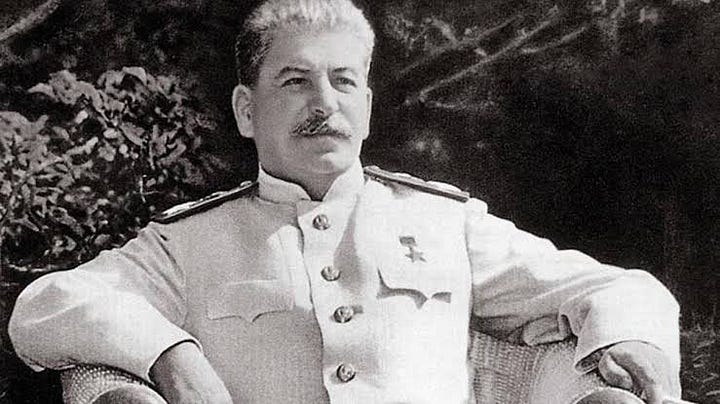
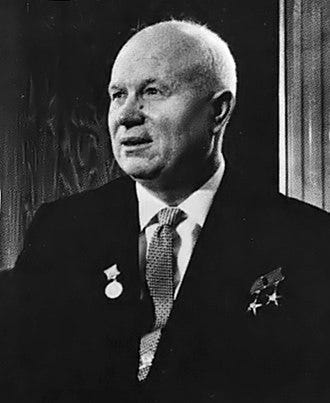
In 1956, Khrushchev gave a speech, commonly known as the Secret Speech—although the contents were soon leaked—that shook the Soviet Union to its core. The official title of the speech was: “On the Cult of Personality and Its Consequences.”
Here are a few excerpts from this speech which was an extraordinary rupture moment for Soviet society, where a regime tries to maintain power and control by naming the crimes of its own dead leader.
“Stalin acted not through persuasion, explanation, and patient cooperation with people, but by imposing his concepts and demanding absolute submission to his opinion.”
“The cult of the individual acquired such monstrous size chiefly because Stalin himself supported the glorification of his own person.”
“Arbitrariness flourished, and anyone could be slandered and branded as an ‘enemy of the people.’”
“Stalin’s willfulness caused enormous harm to our state… He made the Party, the security organs, and the armed forces obedient tools of his unlimited power.”
“Comrades, we should in all seriousness consider this matter and do everything that is necessary to prevent a repetition of what took place in the life of our Party during the period of Stalin’s cult of personality.”
Khrushchev’s admissions were a shock to the Soviet people and to the Party. Nevertheless, it did lead to a thawing of sorts in the repressive policies of the government, and a temporary stabilization of the Soviet Union. But when the personalist glue that had held it together disappeared, the relationship between the Party and the people became brittle; the system survived for decades but ultimately failed in 1991.
A JD Vance-Thiel presidency could go this direction—an attempt to distance the regime from the sins of its father, and an attempt to consolidate power under a far weaker cult of personality.
Chaos: Tito → End of Yugoslavia
When the authoritarian leader of a personalist autocracy dies, there is no one to replace his influence, and within a dozen years, the nation is dissolved.
During WWII, Joseph Broz Tito later known simply as Tito, led the Yugoslav Partisans—the communist-antifascist resistance to the Nazi invasion—and by 1944 successfully liberated Yugoslavia with the help of the Soviets. Tito was the sole authoritarian leader of communist Yugoslavia until his death in 1980. Tito was a charismatic, personalist dictator—although some have called him “benevolent”—with a very strong personality cult that kept his regime in power.
Tito held together a multi-ethnic federation of Serbs, Croats, Slovenes, Bosniaks, Macedonians, Montenegrins, and Albanians—and balanced between the Soviet Union and the West. In 1948, he split with Joseph Stalin, and was the only Eastern European state to successfully evade Soviet dominance. Tito became the leader of the Non-Aligned Movement, a group of nations not formally aligned with or against any major power bloc.
Tito’s personalist, theatrical rule portrayed him as the “Father of the Nation” and used slogans like “After Tito — Tito!” to suggest his presence was permanent.
Portraits of Tito hung in homes, offices, and schools—mandatory in many institutions.
His image appeared on murals, postage stamps, medals, and folk songs.
Towns, factories, and streets were named after him.
In 1980, when Tito died, there was no succession plan—and no leader in the federation with the charisma to replace him. The federal structure of Yugoslavia looked solid with Tito in charge, but in his absence, the nation began to evaporate. Economic stagnation and debt crisis exposed and deepened ethnic and social divides. Nationalist leaders like Slobodan Milošević in Serbia and Franjo Tuđman in Croatia weaponized those grievances to consolidate power.
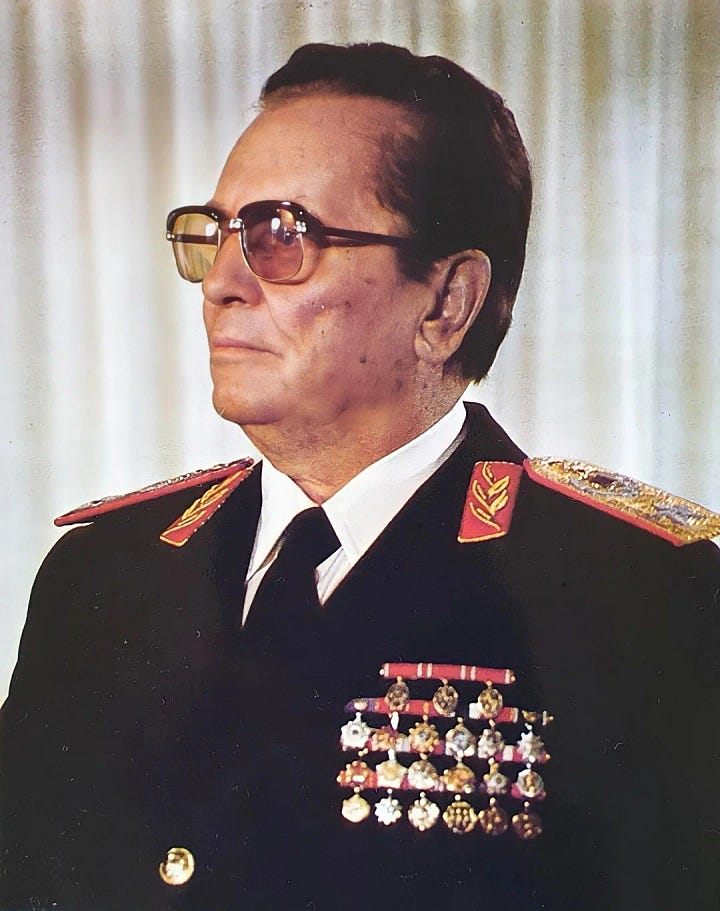
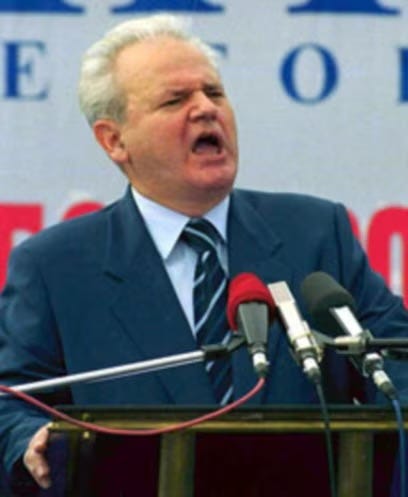
While Tito’s image still evoked nostalgia, it could no longer paper over the multi-ethnic fractures being exploited, and by the early 1990s Yugoslavia violently dissolved.
If Trump were to suddenly die, this is the most volatile path the country might take: a feeble attempt to consolidate the regime in an atmosphere where stronger more radical factions are vying for power, independence and ideological purity—while the rule of law is weakened or absent.
Will We Ever Learn?
In these examples, we are presented with three terrible outcomes when a personalist dictator disappears. The regime might reconstitute in a more durable form—machinery of autocracy that lasts for a long time; it might try to survive through distancing itself from its leader and reorienting around an ideology instead of a man; or it might simply collapse in short order with no charismatic figure to hold it together.
The big difference, of course, is that America is not yet a full personalist dictatorship like Caesar’s Rome, Stalin’s USSR, or Tito’s Yugoslavia. The federal government is behaving like one, but that is not the same as succeeding at being one. Remember, it was only January of this year that the federal government was, relatively speaking, normal.
While I think all three of these outcomes are unfortunately possible, I also believe that we can still learn from history and take actions to prevent any of this from taking long-term hold. Of course, all of this still depends on the crucial question of if, not when, Trump leaves the national stage. No matter how fervently liberals and Democrats pray for his demise, there are processes beyond our control—and beyond our ability to know—driving the bus of Trump’s mortality.
Best Guess and Next Steps
I don’t think it is a coincidence that Trump has not been making appearances and doesn’t plan to—nothing on his schedule through Monday—for a full week after his bizarre Cabinet meeting; that he is obviously hiding something with his hand; and that JD Vance seems to be preparing people for the possibility of him being the president.

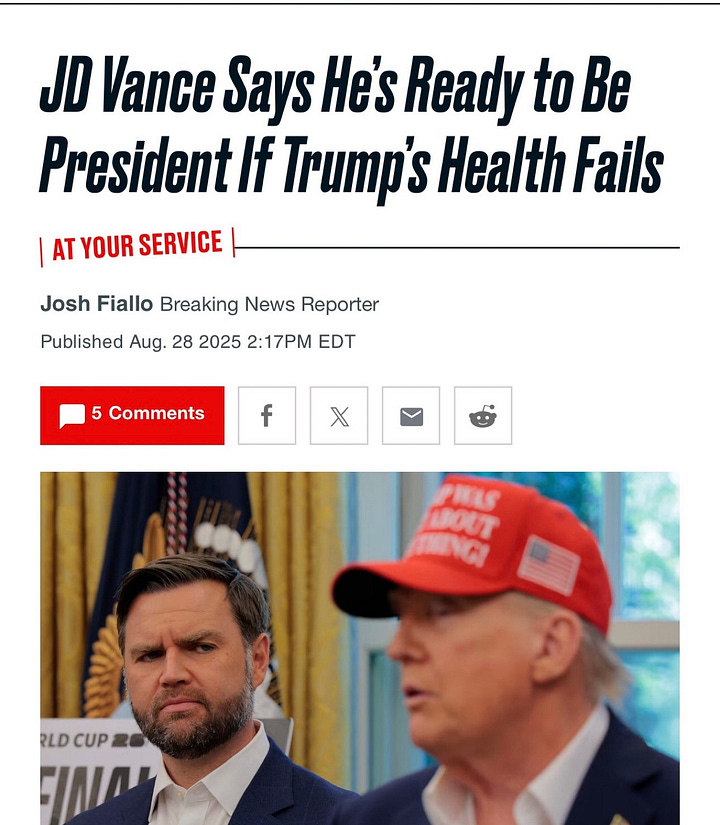
If Trump were to die or disappear in the near-term, it might give President Vance enough time to keep Trump’s followers on board and to consolidate the PayPal Mafia’s control over the levers of power. But if Trump hangs on and continues to abuse and entrench his power for months or years, the damage to the country from the dictator’s dilemma will rise.
If Vance were to attempt to take command while the population is reeling from a recession, overseas conflicts, and increasingly brutal state-sponsored terrorism next year, for example, you might see a serious disruption in MAGA that splinters into more radical elements. JD Vance will not be able to hold Trump’s base through the force of his personality, and there will be people who will see themselves as far more deserving than the latecomer who jumped on the Trump train—on Peter Thiel’s dollar
People like Flynn, Tucker Carlson, Steve Bannon—and even popular extremists like Alex Jones and Nick Fuentes—would see a vacuum to take advantage of, to try to build an opposing, and potentially violent, movement to become the new official savior of the former MAGA.
While this seems like a terrible outcome, and it is, it may be the best of the options in front of us. As none other than Julius Caesar said: “divide et impera,” divide and conquer. If and when Trump dies, our job is to ensure that what’s left of his cult never has the chance to reanimate—and that the system he built to control them is exposed, dismantled and destroyed.
If you are able to help me continue my work, please consider upgrading to a paid subscription. It really means a lot. Thank you!
Here are a few benefits to upgrading:
Live Zoom call each Sunday
Ability to comment and access all content
Wonderful, supportive community
Helping independent journalism fill in the gaps for our failing media
Thank you for reading and sharing my work. Grateful for your support.
If you’d like to help me with expenses, here is my DonorBox. 💙
If you’d like to help with my legal fees: stopmikeflynn.com.
My podcast is @radicalizedpod & YouTube — Livestream is Thursdays at 4PM PT.
Bluesky 🦋: jim-stewartson
Threads: jimstewartson


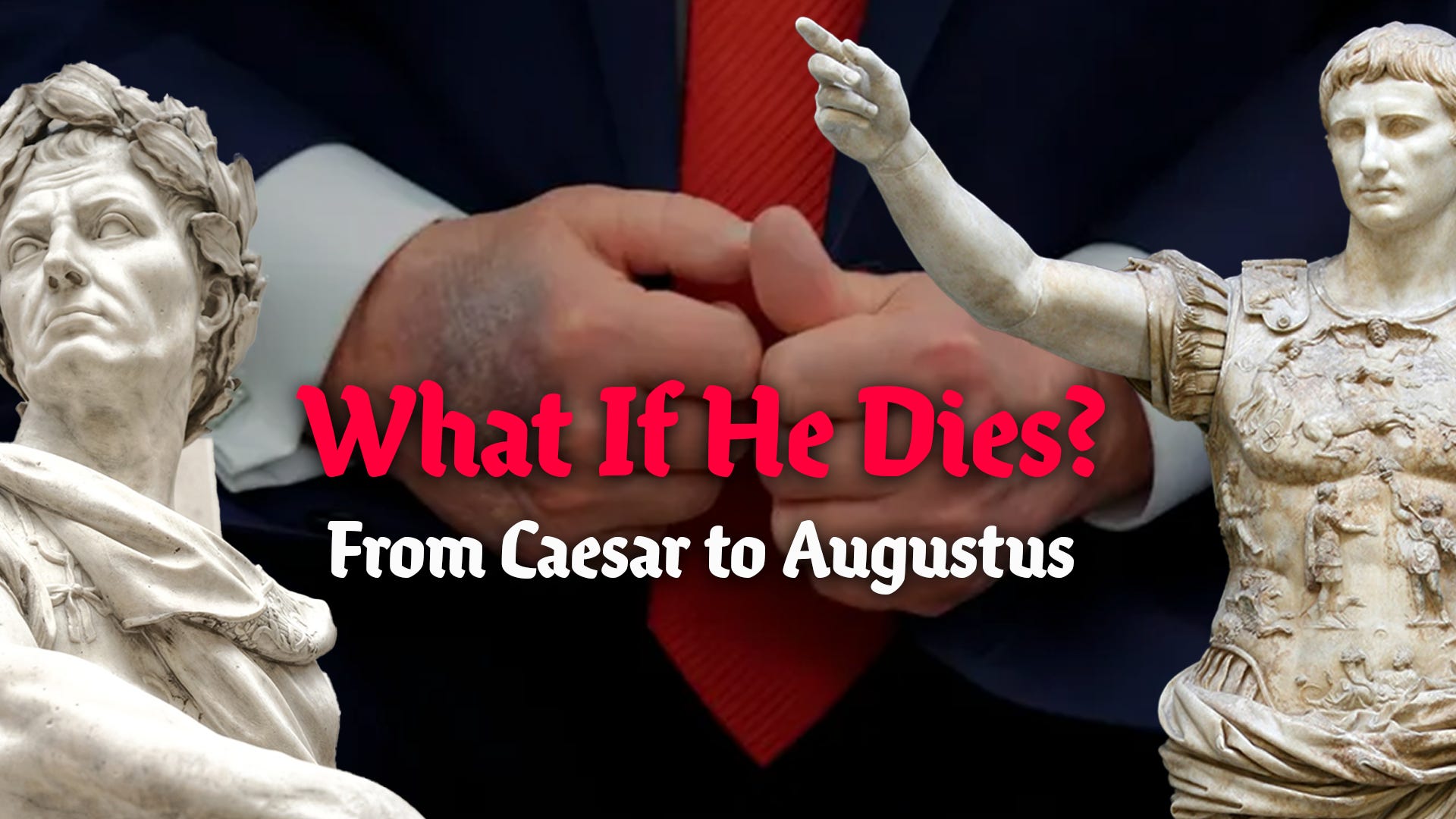
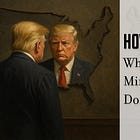

Livia, the wife of Caesar Augustus, is who really ran the empire for decades. Does Usha have it in her?
Great piece, Jim, as usual.
Ahead of the curve, as usual. Thanks for this!